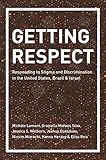Getting Respect : Responding to Stigma and Discrimination in the United States, Brazil, and Israel / Michèle Lamont, Hanna Herzog, Nissim Mizrachi, Elisa Reis, Joshua Guetzkow, Jessica Welburn, Graziella Moraes Silva.
Material type: TextPublisher: Princeton, NJ : Princeton University Press, [2016]Copyright date: ©2017Description: 1 online resource (400 p.) : 15 tablesContent type:
TextPublisher: Princeton, NJ : Princeton University Press, [2016]Copyright date: ©2017Description: 1 online resource (400 p.) : 15 tablesContent type: - 9780691167077
- 9781400883776
- Discrimination -- Brazil
- Discrimination -- Israel
- Discrimination -- United States
- SOCIAL SCIENCE / Discrimination & Race Relations
- African Americans
- Arab Palestinians
- Black Brazilians
- Ethiopian Jews
- Mizrahi Jews
- New York
- Rio de Janeiro
- Zionism
- assault on worth
- cultural membership
- cultural repertoires
- discrimination
- ethnicity
- ethnoracial exclusion
- ethnoracial group
- group boundaries
- groupness
- marginalized groups
- race relations
- race
- racial tension
- racism
- recognition
- redistribution
- self-identification
- social psychology
- stigmatization
- 305 23
- HM821
- online - DeGruyter
- Issued also in print.
| Item type | Current library | Call number | URL | Status | Notes | Barcode | |
|---|---|---|---|---|---|---|---|
 eBook
eBook
|
Biblioteca "Angelicum" Pont. Univ. S.Tommaso d'Aquino Nuvola online | online - DeGruyter (Browse shelf(Opens below)) | Online access | Not for loan (Accesso limitato) | Accesso per gli utenti autorizzati / Access for authorized users | (dgr)9781400883776 |
Frontmatter -- contents -- List of tables -- Preface and Acknowledgments -- Introduction -- Chapter 1: Accounting for Differences -- Chapter 2: The United States -- Chapter 3: Brazil -- Chapter 4: Israel -- Conclusion -- Appendix 1: Methodology -- Appendix 2: Tables of Frequency of Experiences with and Responses to Stigmatization and Discrimination by Respondents -- Notes -- References -- Index
restricted access online access with authorization star
http://purl.org/coar/access_right/c_16ec
Racism is a common occurrence for members of marginalized groups around the world. Getting Respect illuminates their experiences by comparing three countries with enduring group boundaries: the United States, Brazil and Israel. The authors delve into what kinds of stigmatizing or discriminatory incidents individuals encounter in each country, how they respond to these occurrences, and what they view as the best strategy-whether individually, collectively, through confrontation, or through self-improvement-for dealing with such events.This deeply collaborative and integrated study draws on more than four hundred in-depth interviews with middle- and working-class men and women residing in and around multiethnic cities-New York City, Rio de Janeiro, and Tel Aviv-to compare the discriminatory experiences of African Americans, black Brazilians, and Arab Palestinian citizens of Israel, as well as Israeli Ethiopian Jews and Mizrahi (Sephardic) Jews. Detailed analysis reveals significant differences in group behavior: Arab Palestinians frequently remain silent due to resignation and cynicism while black Brazilians see more stigmatization by class than by race, and African Americans confront situations with less hesitation than do Ethiopian Jews and Mizrahim, who tend to downplay their exclusion. The authors account for these patterns by considering the extent to which each group is actually a group, the sociohistorical context of intergroup conflict, and the national ideologies and other cultural repertoires that group members rely on.Getting Respect is a rich and daring book that opens many new perspectives into, and sets a new global agenda for, the comparative analysis of race and ethnicity.
Issued also in print.
Mode of access: Internet via World Wide Web.
In English.
Description based on online resource; title from PDF title page (publisher's Web site, viewed 24. Aug 2021)


